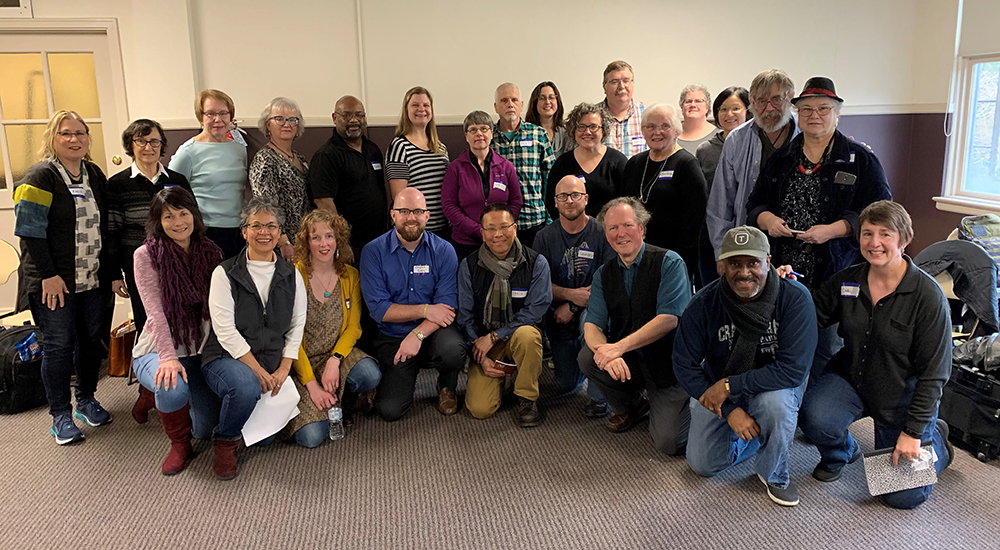This is about how some Veterans discovered that writing can promote health and happiness.
Earlier this year, more than forty Veterans, family members, VA caregivers, and members of the community attended a writing retreat at the Portland, Oregon, VA medical center.
The afternoon gave participants an opportunity to write, share ideas and learn how to begin and sustain a writing practice.
The event was initiated by Craig Ling, dentist and Chief of Dental Service with support from Kim Stafford, Oregon’s Poet Laureate, who facilitated the event.
Outside of the hospital, Ling (fifth from the right – front row – in the photo above) enjoys reading and loves to write poetry.
“Many of my patients write stories and poetry,” said Ling. “One of my patients once told me that it wasn’t until he started writing that he started to heal after Vietnam because it allowed him to say what was on his mind and in his heart.”
Ling brought the idea of creating a writing event for Veterans to a few of his fellow coworkers including nurse Judy Ulibarri, Helen Lee, VA Nurse Residency Program Director, and Nathan Davis, administrative assistant for VA Dental Service. Together Ling and Stafford worked out all the details to make a writing workshop happen – and it was a huge success.
The theme of the event was related to healing.
During the writing workshop, Stafford asked participants, “Is the question, ‘What’s the matter with you?’ or ‘What matters to you?’”
There was full capacity at the event. Throughout the day, participants were engaged in conversation with Stafford and other writers, and everyone walked away with a notebook full of poems, ideas and scribbles.
“When you write, no one will tell you what you write is wrong,” said Stafford. “When you write about something good you’ve lost, you can recover it.”
Many of the Veterans and participants shared that they have a need for writing and that writing helps them heal. The workshop gave everyone the opportunity to connect with one another, learn new skills, and write about healing topics. The group included writers of all levels from individuals learning about writing to experienced authors.
Chaplain Gregory Widmer is an outpatient mental health chaplain with VA Portland and a combat Veteran of the Iraq War. He joined the workshop in an official capacity but was also a participant and found the time very rewarding and had these thoughts:
“This writing workshop addressed the whole person. Each Veteran was encouraged to write from the heart. Sharing was optional. We used writing prompts to go deeper into our journeys. As an Iraq War Veteran, I had not journaled for years. There was too much pain and confusion inside.
“However, there was something cathartic about this event that broke the dam of emotions. Sometimes it’s easier to write than speak. I left feeling full and spoke with others who felt the same. Writing seems to be an untapped tool with tremendous potential to heal Veterans and to process the chaos of trauma.”
Here’s a poem by Chaplain Widmer:
Guys on the floor are analyzing sermons.
Others are debating Calvinism vs. Arminianism.
There are board games.
Prayer Services.
Clean Humor.
I am experiencing reverse culture shock.
No mortars.
No hajis.
No potential IED’s.
No porn.
No cussing.
I feel numb.
The atmosphere feels sophomoric.
My former roommate and ministry partner,
Is trying to joke around.
I feel numb.
I’m stoic in the face of his horseplay.
He appears disappointed, maybe even agitated.
He states, “You’ve changed;
You’re not funny anymore.”
There were many different programs and organizations in attendance to show their support including Write Around Portland, Northwest Narrative Medicine Collaborative, StoryCorps, Art Therapy from Lewis and Clark, and Portland VA’s “My Life, My Story” program.
“We want to continue working with the arts,” said Ling. “This event was one of many ways we can touch people and continue to care for them.”
And a poem by Veteran Gary Anderson:
“On the day I realized trauma has been around since the beginning of Man:
One earth, one heart, drum beat, same beat,
healing in the house of the longest night.
So you mean there is no medal for wounds to the soul?
When does a soldier lose parts of soul?
What moment marks the silent departure?
When fear is gained?
Or when fear is lost?
What does the healing path look like?
The hinge, a pivot, on swinging gate or door.
Forth and back, memories released in passing,
one room, one meadow to the next.
About the author: Ruth Zhang is a Public Affairs Specialist with the VA Portland Health Care System
Topics in this story
More Stories
Study underscores important role COVID vaccination can have in protecting Veterans from infection and reducing long-term health consequences
Columbia VA’s robotic surgery teams completed their 800th robotic surgery and are on schedule to hit 1,000 by the end of the year.
In a decentralized clinical trial, Veterans can participate from their own homes or local VA instead of having to travel to a research site.







